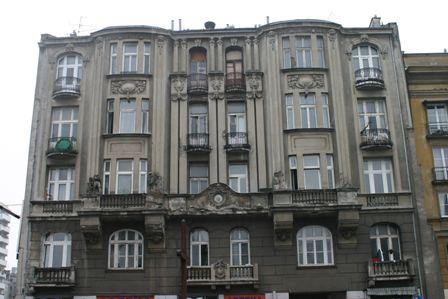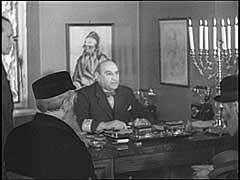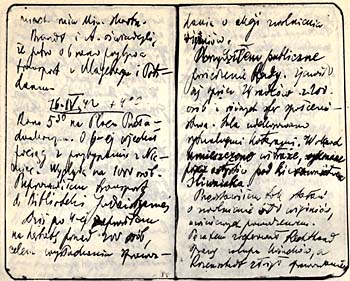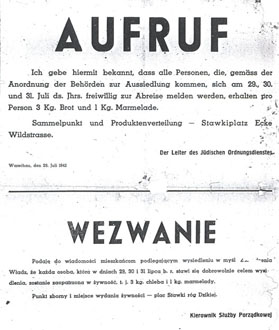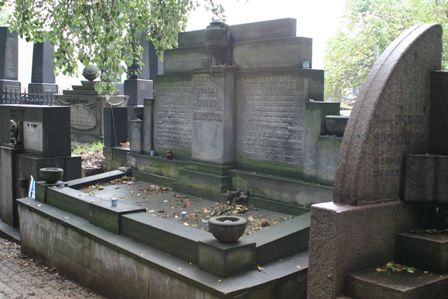Holocaust Education & Archive Research Team |
|
Ghettos
Introduction to the Ghettos of the Holocaust
Jewish Ghettos The Judenrat Judenrat Leaders Prominent Jews
| |||
Adam Czerniakow and His Diary
Adam Czerniakow was born in 1880 in Warsaw. After completing his studies in Warsaw in chemistry at the Warsaw Polytechnic, he went to study industrial engineering in Dresden, Germany. Shortly before World War One he became involved in Jewish public life.
He dedicated himself to defending and promoting the interests of Jewish craftsmen and he published extensively on subjects concerning Jewish artisans, many of his articles appearing in the “Hantverker- Zeitung”, the publication of the General Association of Jewish craftsmen.
In the 1924 yearbook of that association, published on the tenth anniversary of its founding, Czerniakow published a long article outlining a comprehensive programme for vocational training and technical schools.
He taught for many years in the Warsaw Jewish community vocational schools. He took a stand against compulsory unionisation of craftsmen, in a lecture delivered to the First Congress of Jewish Artisans on 5 October 1925. The address he gave was later published as a booklet.
He was active in the struggle against the 1927 Guild Law, which in effect ousted Jewish workers from their jobs and shops. Czerniakow was a member of the Engineers Association, known for its assimilation stance, but on the other hand he joined the Jewish Nationlist Minority Block, established to counteract attempts of Polish reactionary elements to squeeze minority representation out of Parliament.
From 1927 to 1934 Czerniakow was the elected representative of Jewish artisans, on the National Jewish list in the Warsaw Municipal Council. He played an active part in the 1928 Sejm (Polish Parliament) and Senate elections and participated in the campaign for Jewish minority rights led by Yitzhak Gruenbaum. He spoke out against government discrimination and persecution.
In the 1931 by-elections he won a place in the Senate, but the Pilsudski Government dissolved the Senate and Sejm before the first sitting.
Before the outbreak of World War Two, he was nominated to the appointed Executive Council of the Warsaw Jewish Community, as a representative of the Jewish craftsmen. He also chaired that Councils education department. Together with Maurcy Mayzel, Marek Lichtenbaum and Labedz, he was a member of the Warsaw delegation to the 1939 General Congress of Polish Jewry for Eretz Israel.
On 23 September 1939, during the siege of Warsaw by the Germans, Stefan Starzynski, the Mayor and Commissioner for Civil Defence, appointed Czerniakow the “Head of the Jewish Religious Community”.
On 4 October 1939, a few days after the city’s surrender he was taken to Police and Gestapo headquarters in Warsaw, at 25 Szucha Avenue, where he was ordered to add 24 people to the Jewish Community Council and to assume its leadership.
During the intial contacts over establishing the Jewish Council he dealt with SS-Hauptmann Bernhard Baatz, of Einsatzgruppe IV.
Czerniakow official title was the Chairman of the Jewish Council, as from 14 May 1941 his position was regarded as the “Mayor”, but the Chairman of the Jewish Council in Warsaw was still the most common used title.
Czerniakow kept a daily diary, throughout his time as Chairman of the Jewish Council in Warsaw, and is an invaluable insight into the daily life under the Nazis, and key extracts from the diary, are used here, to illustrate some of the major incidents of the Warsaw Ghetto, as well as examples of Czerniakow’s feelings and humour:
8 October 1939 – Morning from 8:30 to 12 at the SS. Waiting for the keys. Later a policeman accompanied me to unlock the Community hall. The remaining rooms were locked and sealed. Twenty four chairs were placed in the hall and inventory was taken.
25 October 1939 – Office in the morning. Surrendering the radio set.
18 November 1939 – Ghetto postponed for a few months. The Community ordered to place at its borders signs stating Achtung Seuhengefahr Entrit Verborten (Danger – Epidemics – Entry Prohibited)
30 November 1939 – A newspaper Nowy Kurier Warszawski was brought in with an announcement on the Jewish armbands, the marking of Jewish shops as well as the execution of the 53 from Nalewki Street.
20 December 1939 – Prayers in synagogues prohibited. Rumours about Praga ghetto.
17 January 1940 – Today I must prepare a report on my Jewish property. Alas I do not posses much, although in these times this is a blessing.
25 August 1940 – In the morning at the Community. Someone asked me, what was my Chairmanship all about? I replied that it made me lose my paunch.Zabludowski is back. Our workers are in a camp at Belzec, a long way from Lublin. The camp is not under the control of the Arbeitsamt.
5 September 1940 – In the morning at the Gestapo in regard to the workers from the Battalion and those arrested yesterday at Unia Square.
Rumkowski from Lodz, visited me at the Community in the company of an SS man and the Chief of the Food Office.
14 October 1940 – Fischer’s proclamation about the ghetto has just now been published. The boundaries do not correspond with the plan that was handed to me. Legions of Jews from Praga are trekking to Warsaw, their pushcarts filled with pitiful junk.
4 November 1940 – When I appeared at the Battalion office, the officer in charge set upon me., hitting me on the head till I fell. At this point the soldiers started kicking me with their boots. When I tried to stand up they jumped on me and threw me down the stairs. Half a flight down they beat me again. In the end I was dragged to a truck , but was soon ordered to move into another one.. I was then transported with Singer, Zylberstajn, and Popower in turn to Szucha Avenue, to Pawiak prison, the University, back to Szucha Avenue.
8 November 1940 – Leaden skies. It rains. Summonses for tomorrow to Mende. Major Hohenauer called me for a conference on the Order Service. I went to see him with Szerynski.
20 November 1940 – In the morning at the Community. At 10 in the morning in the Umseidlungsamt, they will set up the Transferstelle (Exchange Office) close to the Ghetto.
5 May 1941 – In the morning at the Community. The Judenrat is going to the sole self-governing authority with the Obmann (Chairman) as mayor.
8 May 1941 – It looks like Dr Auerswald will be named as Kommissar for Jewish Affairs, and Mohns as District Chief (Governor). Several days ago Gancwajch organised a gathering and kept his guests through the night. Among those invited were Korczak (!!), naturally Stanislaw Rozenberg, Glocer etc.
10 May 1941 – In the morning I was informed by Scherer that he would be replaced by Knoll. Knoll inquired why Gancwajch and Sternfeld are trying to oust me from the Council, adding that they are quite a pair.
14 May 1941 – Mohns has informed us that the Governor named me the mayor of the Jewish Quarter.
16 May 1941 – Rumkowski telephoned that he will visit the Community tomorrow.
30 May 1941 – Auerswald said the “13” is going to be subordinate to the Jewish Council.Gancwajch must be admitted to the Community Authority., perhaps as a legal counsel.
11 June 1941 - In the morning at the Community. It has been raining. Fortunately, for us this does not entail any cost to the Community.
21 June 1941 – In the morning at the Gestapo, Muller, whom I paid a visit with Szerynski, declared that Gancwajch could live off the real estate; he will in no way be connected with the Community Authority.
21 July 1941 – In the Community I received a letter from the Kommissar on the Gancwajch bureau - The Control Office for Combating the Black Market and Profiteering in the Jewish District of Warsaw is hereby dissolved.
2 August 1941 – On Saturday, as usual in Szucha Avenue with Szerynski. We found nobody there. Kommandeur Muller has been transferred to Lublin.
13 October 1941 – Haendel introduced me to the Aryan Contractor who will build the walls
31 October 1941 – I toured the new streets which are to be incorporated in the ghetto. What shabby buildings and streets.
4 November 1941 – Auerswald toured the wall construction sites.
12 November 1941 – We have received unofficial news that those caught leaving the ghetto will be shot in the Jewish detention facility the day after tomorrow.
17 November 1941 – At 7;30 the execution was carried out in the prison yard.
13 December 1941 – I moved to an apartment at 2O Chlodna Street.
19 January 1942 - I have heard that Auerswald had been summonsed to Berlin. I cannot shake off the fearful suspicion that the Jews of Warsaw may be threatened by mass resettlement
23 January 1942 – I went to see Auerswald and asked him whether he had received any new instructions from Berlin. He answered that his trip to Berlin was private.
25 January 1942 – A nocturnal fantasy. I was born on Zimna Street and want to die on Chlodna Street. Zimna in Polish means Cold and Chlodna means cool.
19 February 1942 – I went to see Auerswald. He inspected the prison yesterday. As a result 50 people were directed to a camp, probably Treblinka.
23 February 1942 – In the morning at the Community. One fellow asks another: what is the news from the front? I have no idea , my apartment is at the back, was the reply.
1 April 1942 – News from Lublin. Ninety per cent of the Jews are to leave Lublin within the next few days. The 16 Council members together with the Chairman Becker were reportedly arrested. Relatives of the other councillors, aside from their wives and children, must also leave Lublin.
In the morning hours about 1,000 expellees from Hannover and Gelsenkirchen were sent over. They were put in the quarantine at 109 Leszno Street.
5 April 1942 – At 8am 1,025 expellees from Berlin came. Mainly older people, partly intelligentsia. Many women.
9 April 1942 – In the morning at the Community. Auerswald ordered 160 young German Jews from the quarantine to be taken to Treblinka.
10 April 1942 – At 10 in the morning a transport of German Jews 17 to 35 years old, left for Treblinka from the quarantine at 109/111 Leszno Street.
11 April 1942 – Later to Auerswald about the orchestra. The Kommissar sent me a letter yesterday suspending performances of the orchestra for 2 months for having played the works of Aryan composers.
15 April 1942 – Brandt and Auerswald informed us that a transport will arrive from Magdeburg and Potsdam at 6 o’clock tomorrow morning.
16 April 1942 – The train with the newcomers from Germany arrived at 6am, it seems there are about 1,000 people. I led the transport to the Judaic Library.
18 April 1942 – I went to see Auerswald, he gave me a list of containing 78 names from the last transport from Germany, these people are to be sent to Treblinka. Besides he gave me two letters from the workers who are already there. One is asking for phonograph records, the other for tools.
I raised the subject of last night’s events. He knows what had happened. He is of the opinion that this was a special action.
19 April 1942 – Gepner, Sztolcman, Graf and Kobryner came in. Apropos recent occurrences, they claim that underground papers may bring about untold harm to the Jewish population.
21 April 1942 – In the morning with Brandt. He informed me that it was the underground papers appearing in the ghetto that brought about the repressive measures that night and that more severe means will be employed if the papers continue to appear.
22 April 1942 – They brought to the Jewish prison 10 Gypsies, men and women with their “king” Kwiek.
27 April 1942 – A treansport of 1,000 people arrived from Bohemia today. They were unloaded at 6am. Later they were assembled in the Great Synagogue. I addressed the gathering.
1 May 1942 – Before 8 in the morning, a call from the Kommissar, ordering me to report at 8am at Bruhl Palace. It turned out that some Propaganda functionaries had arrived. They are going to film the activities of the Council and life in the Quarter.
Szerynski was summonsed by the Kripo to Danilowiczowska Street. We were told he will not return.
2 May 1942 – Brandt told me that Szerynski was arrested on account of the furs which he had left for safekeeping with a Polish police officer who had also been arrested. For the time being Lejkin is likely to be the acting commander. At the moment he outranks everybody else.
3 May 1942 – In the morning at the Community. At 10 the film crew from the Propaganda Office arrived and proceeded to take pictures in my office.
5 May 1942 - In the morning with Brandt. Lejkin was named the acting commander of the Order Service.
I was at the Femina to watch a performance by the children from the Council’s schools.
The film crew is still much in evidence. They are filming both extreme poverty and the luxury(coffeehouses). The positive achievements are of no interest to them.
15 May 1942 – At 8;30 I am waiting at home for the film crew. The movie men arrived at 8;45 and were shooting until 12;30.
The city is full of rumours about deportations. Tens of thousands are being mentioned. Purposeful work under such conditions is worthy of admiration. And yet we are doing it everyday. Tears will not help us. I must repeat Dickens’ words once more – “You cannot wind your watch with your tears”.
25 May 1942 – In the morning at the Community. Probst and the Kommissar arrived at Tlomackie Street. Thirty Jews have been sent to Treblinka.
1 June 1942 – The film makers had ordered that up to a hundred men and women, half of them from the higher strata, be made available and then they filmed them in the Community auditorium.
Auerswald called at 3pm asking for several hundred more people for Treblinka.
19 July 1942 – In the morning at the Community. Incredible panic in the city. Kohn , Heller and Ehrlich are spreading terrifying rumours, creating the impression that it is all false propaganda. I wish it were so. On the other hand there is talk of about 40 railroad cars ready and waiting. Kohn claims the deportation is to commence tomorrow at 8pm with 3,000 Jews from the Little Ghetto. He himself and his family slipped away to Otwock. Others did the same.
20 July 1942 – In the morning at 7;30 at the Gestapo. I asked Mende how much truth there was in the rumours. He replied that he had heard nothing. I turned to Brandt, he also knew nothing. When asked whether it could happen, he replied he knew of no such scheme. Uncertain I left his office. I proceeded to his chief, Kommissar Bohm. He told me it was not his department but Hohmann might say something about the rumours.
I mentioned that according to rumours, the deportation is to start tonight at 7;30. He replied that he would be bound to know something if it were about to happen.
Not seeing anyway out, I went to the deputy chief of Section lll, Scherer. He expressed his surprise hearing the rumour and informed me that he too knew nothing about it. Finally, I asked whether I could tell the population that their fears were groundless. He replied that I could and that all the talk was utter nonsense.
I ordered Lejkin to make the public announcement through the precinct police stations. I drove to Auerswald. He informed me that he reported everything to the SS Polizeifuhrer. Meanwhile First went to see Jesuiter and Schlederer, who expressed their indignation and promised an investigation.
21 July 1942 – In the morning at the Community. Just before noon officers of the Security Police ordered me to detain in my office those Councillors who were present in the Community building. Soon the members of the Council in my office were arrested in groups. At the same time the senior officials of the Provisioning Authority, with Gepner heading the list, were also seized.
I decided to stay at the Community until 6pm, having brought my wife Felicja (Niunia) there earlier. The evening was quiet. During the night deaths.
22 July 1942 – In the morning at 7;30 at the Community. The borders of the Small Ghetto surrounded by a special unit in addition to the regular one.
Sturmbannfuhrer Hofle, and associates came at 10 o’clock. We disconnected the telephone. Children were moved from the playground opposite the Community building.
We were told that all Jews irrespective of sex and age, with certain exceptions will be deported to the East. By 4pm today a contingent of 6,000 people must be provided. And this at the minimum will be the daily quota.
We were ordered to vacate a building at 103 Zelazna Street for the German personnel who will be carrying out the deportation. Sturmbannfuhrer Hofle in charge of the deportation asked me into his office and informed me that for the time being my wife was free, but if the deportation were impeded in any way, she would be the first one to be shot as a hostage.
23 July 1942 – In the morning at the Community. Worthoff from the deportation staff came and we discussed several problems. He exempted the vocational school students from deportation. The husbands of working women as well.
He told me to take up the matter of orphans with Hofle. The same with reference to craftsmen. When I asked for the number of days per week in which the operation would be carried on, the answer was 7 days a week.
Throughout the town a great rush to start new workshops. A sewing machine can save a life. It is 3 o’clock. So far 4,000 are ready to go. The orders are that there must be 9,000 by 4 o’clock.
Some officials came to the post office and issued instructions that all incoming letters and parcels be diverted to the Pawiak prison.
Later the same day, Czerniakow decided to take his own life, by swallowing a potassium cyanide pill. Before swallowing the pill he wrote two letters, one to his wife, one to the Jewish Council saying:
“They are demanding that I kill the children of my people with my own hands. There is nothing for me to do but die”.
Czerniakow’s wife Niunia survived the war and made the diary available, Jas their only son, fled to the Soviet occupied territory, did not survive the war.
Sources:
The Warsaw Diary of Adam Czerniakow
Copyright SJ H.E.A.R.T 2007
|

